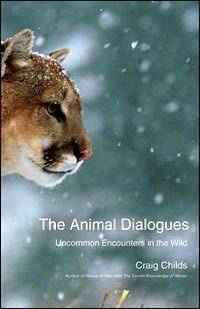 THE TAPESTRY OF TIME |
 Sunshine, secrets, and swoon-worthy stories—June's featured reads are your perfect summer escape. |

Purchase
Little, Brown & Company Fiction Excerpt of The Animal Dialogues by Craig ChildsAnimals are watching. Right now they are in the woods, many of them looking back over their shoulders or peering down at us from bridges of tree branches as we march below, snapping dry wood with our boot soles and squashing soft, fleshy mushrooms. My companion stops. "Did you hear that?" I stop too, listening to a chittering forest of birds. "What?" I ask. "Something moved over there," he says. "An animal." We both drill our eyes through the trees. I am sixteen years old and, like my friend, I am lost in the mountains of western Wyoming. Not interminably lost, we just do not know exactly where we are — besides being on an untrailed flank of the Teton Mountains, over our heads in jackstraw timber. We had taken off from a road at a random point that morning and barged our way into a steep forest where no signs point the way. We wanted to see what it was like in here. Day packs are slung on our backs, containing water and some food. We have no maps, no compasses. No whistles, flares, or shelters. We have knives in our pockets and the clothes we are wearing — all that is needed for a day of going nowhere. I peer with my friend through a thousand broken shadows, seeing no movement save for twigs springing back as small bark- colored birds flit from one tree to the next. All the way along, we have been hearing animals snitching and scratching, elk lumbering about with heavy sounds, pine squirrels chattering, scolding from overhead. But all we have seen are these few birds. Everything else is lost to us behind tree trunks nearly touching one another. I squint to see better. "How big an animal?" I ask. "Big," he says. "I didn't see it, but it sounded like something big." "I don't see it." "I don't either." Only so long can we stare at nothing, so we start moving again, ducking under branches, touching the ground with our hands, and leaving the big animal — whatever it was — behind. Drunken, wild forest, it is far denser than we anticipated, battering our shins as we step through trapdoors of dead wood. Our hands slash in front of us, clearing branches and beards of dry, stringy lichen. Spiderwebs snap like trip wires across our lips, our foreheads, our arms. We've been side- hilling for hours, taking so many brief, natural paths that we don't really know how to get back. Ahead we find a big dollop of scat on the ground and we stand around it, sweat dripping from our eyebrows, wiped on the backs of our hands. The scat looks like a big can of hash dumped on the ground. It is full of berry hulls and black digested meat. "Bear," my friend says. "Yeah," I agree. "A big bear." "Grizzly, you think?" "What's grizzly scat look like?" "I don't know." My friend turns a grin toward me. "What if it is a griz?" he says excitedly. Should we be excited? I wonder. Better than being nervous, I suppose. I don't want to see the bear. I just like the tingle in my spine telling me there is one nearby. "Let's keep going," he says. "Yeah," I agree. Stupid kids, why not? All we have to follow are animal trails, faint inclinations left by elk or deer or bear that passed through. Even squat clearings left by waddling porcupines come in handy. They are all short- lived, ending as suddenly as they began, putting us back in thick trees where birds send warnings ahead of us, criers calling through green crowns. I crawl under a toppled tree, and my nose grazes the ground. I smell leaf rot and animals. It is the odor of spices in an earthy, slightly unpalatable dish: bonemeal, bobcat urine, wood fungus, worm dung. This is the other side of the coin from the rest of my life, from doors and walls and movie screens. This is the place that does not belong to humans. Animals have scuffed the ground, shat upon it, cleared twigs out of the way, folded down grass in their sleeping. They are talking, leaving messages written in scents on leaves and tree bark, whistling to one another, hearing voices in the distance. As we move, a deer bounds away, stabbing its hooves into the ground with punctuated sounds. Only the tips of its fawn- colored ears are visible over ferns and serviceberry bushes. We look for the deer, but it is gone that fast, vanished back into the folds. After that, a gray jay sails in and lands on a branch to see who we are, its soft, inquisitive eyes following us. I feel as if we are dragging tin cans into the wilderness, startling animals from their many private gardens. A little farther comes a sound like the weight of an elk crashing through dead branches. My friend and I freeze, both listening and wondering if the weight of an elk might also sound like the weight of a mountain lion. I step up on top of a rotten stump, and see nothing. "What is it?" my companion asks. Not taking my eyes off the forest, I say, "I don't know. A big animal. Sounds like an elk." By this age I was accustomed to going out with no adult supervision. My mother had tried Little League on me, and a goofy local version of Boy Scouts, but in the end she just had to shoo me out the door and send me hiking. Both my parents took their own, separate interest in wild places — my father building great fi res and showing me the taste of whiskey on cold Arizona mornings, and my mother lightly tramping the mountains of Colorado and Wyoming, picnicking atop slender timberline ridges. With such parents I learned not to fear wild animals, only to know they are there. The forest deepens. We come into a stand of old- growth trees where Douglas fir and short-needled spruce muscle their way toward the light. No longer is there ground to walk on, only decades of huge trees downed from windstorms and disease. We balance across trunks as big around as cars, fifteen feet off the ground, and follow each other down into warrens of shattered debris. We do not know that a large predator is watching us from only a few feet away. We do not know we are blithely stepping into its territory. We know nothing until it leaps. A rush of motion and sound explodes from between fallen trunks directly beneath our feet. Blood jacks straight into our muscles. We take wings. We fly. Not once do we look down, not even glimpsing the color of this creature. It is large, something with strong lungs. I can hear its claws grinding dead wood. The animal fills the forest with a territorial uproar unlike anything I have ever heard. I am gone. Before my conscious mind even recognizes the true presence of danger, before a second passes, I am turned around and a good twenty feet away, trying to outrun my companion with all my might. The animal's voice breaks the air at my back. My mouth goes instantly dry, my whole body cold and fast from adrenaline. I sail over dead trees. Feet barely touch anything solid. I spot a snowmelt swamp cupped nearby into the slope and I think of diving into it to escape this beast, but all I can see is myself bogged to the knees with some unknown creature feasting on my torso. For all I know this is an undiscovered animal, a huge, clawed primate, a meat-eating Sasquatch. I'm not ready to die. We run through our own cacophony of snapping branches, our hands flinging tree limbs out of our way like we're deflecting daggers in midair. Down the steep slope only our boot tips touch ground. I become an acrobat, no gap between hand and eye, no coordination needed because I am right now a single muscle sliding like pure light between the trees. They say not to run. Stand your ground or curl up in a fetal ball. Protect your head and your vital organs. Bear, mountain lion, wolverine: whatever the case, do not turn and run. Do not reveal your back and initiate a chase. By the time such warnings enter my mind, I am making a full- speed exit, hoping my companion will fall prey first and give me some extra seconds. The forest comes to an end and we break into an open, day-lit meadow exactly where we had started hours earlier. A couple of miles in the distance is a road and the car we left there. We had beelined our way back, sprinting down the mountain as if we knew exactly where we were going. We stumble to a halt, panting, leaning over with hands planted on our thighs. We turn and look back. There is no beast. Whatever it was, it has not pursued us. After a minute of watching, my heart pumping but winding down, I say, "Mountain lion. You think?" "Yeah." My friend exhales. "Mountain lion." "Or a bear?" I ask. "What does a bear sound like?" As I look into the trees, I wonder how many animals are now settling from our loud, desperate visit. How many eyes had watched us pass, how many heads turned to see us careening through the woods? We overturned their applecarts, stampeded through their bedrooms and dining rooms, threw open their doors. We start laughing. We laugh at ourselves. We laugh at our good fortune — both the fortune of encountering what must have been a large predatory animal and the fortune of it not running us down and devouring us. We chide each other, letting our guard drop a little. But we do not take our eyes off the dark wall of trees. There is an animal inside with the smell of us fresh in its nostrils. I realize that it had not been attacking us. We would have been easy to catch. Instead, the sound of its voice was strictly territorial, designed to root down into our spines and trigger a flight response. We did as we were told. We answered the animal clearly, playing our part in the conversation with everything we had. When my companion finally turns and walks into the meadow toward the road, I linger. I am not ready to render myself back into a human being, not ready to return to a car and an asphalt highway. I want to stay just a moment longer. I peer into the forest, where every bit of darkness and light has a face, a set of eyes looking out at me. Nothing emerges. I feel the tug at my back, my friend walking away, and I turn to catch up and become human again. Animalia Copyright © 1997, 2007 by Craig Childs Excerpt from The Animal Dialogues by Craig Childs |
|
| |||
|
||||



 © 2003-2025
© 2003-2025